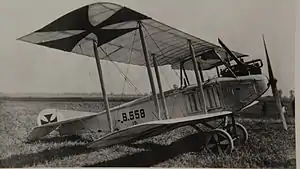Aviatik B.II (Germany)
Note: Not to be confused with the Austro-Hungarian Aviatik B.II series 32, 32.7 and 34 which were different aircraft.[1]
| B.II (German) | |
|---|---|
 | |
| A German Aviatik B.II | |
| Role | Reconnaissance aircraft |
| Manufacturer | Aviatik (Germany) |
| Designer | Robert Wild |
| First flight | 1915 |
| Introduction | 1915 |
| Retired | 1916 |
| Primary user | Luftstreitkräfte |
The Aviatik B.II was a reconnaissance aircraft built in Germany during World War I.
Design and development
The (German) Aviatik B.II was a two-seat biplane of conventional configuration that seated its pilot and observer in tandem, open cockpits. Compared to its predecessor, the B.I, the B.II had a more powerful engine and revised nose design that faired the powerplant in more neatly, and a single "rhino horn" collector stack for the exhaust. A variety of two- and three-bay wing designs were utilised during production. While originally no armament was fitted (in common with other B- class aircraft), later production versions received a machine gun for the observer. All were withdrawn from front line service by early 1916, however the type continued in use as a trainer for a time with advanced flying training units (it is known that the B.II served in this role at FEA 9 at Darmstadt during 1916).[2]
Specifications
Data from [3]
General characteristics
- Crew: 2
- Length: 7.1 m (23 ft 4 in)
- Wingspan: 12.35 m (40 ft 6 in)
- Height: 3.15 m (10 ft 4 in)
- Gross weight: 1,071 kg (2,361 lb)
- Powerplant: 1 × Mercedes D.II 6-cylinder water-cooled in-line piston engine, 89 kW (120 hp)
- Propellers: 2-bladed fixed-pitch propeller
Performance
- Maximum speed: 100 km/h (62 mph, 54 kn)
- Endurance: 4 hours
- Service ceiling: 6,100 m (20,000 ft)
References
- Grosz, Peter M.; Haddow, George; Scheiner, Peter (2002) [1993]. Austro-Hungarian Army Aircraft of World War One. Boulder: Flying Machine Press. pp. 158–160. ISBN 1-891268-05-8.
- Cowin, H.W. (2000). German and Austrian aviation of World War I : a pictorial chronicle of the airmen and aircraft that forged German airpower (1st ed.). Oxford: Osprey Pub. ISBN 1-84176-069-2.
- Angelucci, Enzo (1983). The Rand McNally encyclopedia of military aircraft, 1914-1980. San Diego, California: The Military Press. p. 24. ISBN 0-517-41021-4.
Further reading
- Taylor, Michael J. H., ed. (1989). Jane's encyclopedia of aviation. London: Portland House. ISBN 9780517691861.
- World Aircraft Information Files. London: Bright Star Publishing. p. File 889 Sheet 89.
External links
| Wikimedia Commons has media related to Aviatik B.II. |